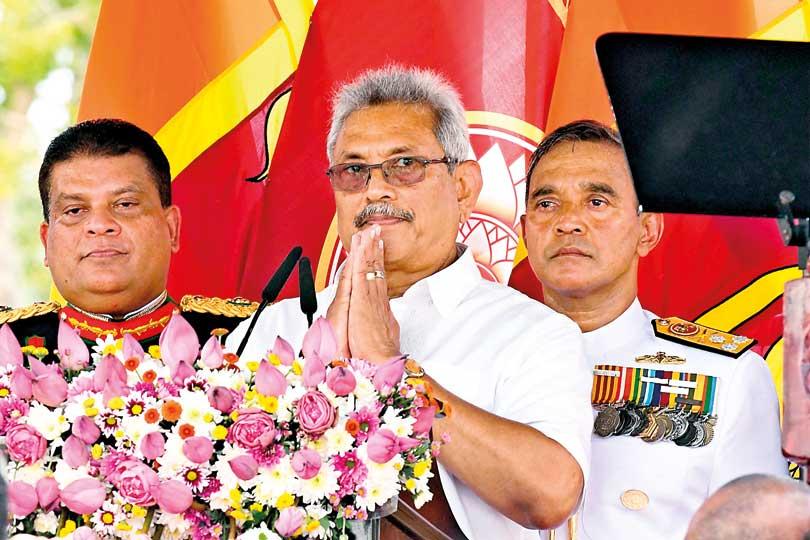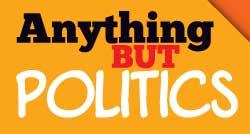Reply To:
Name - Reply Comment

Sri Lanka’s President elect Gotabaya Rajapaksa is now planning to undertake his first official visit abroad to India at the end of this month.
 President Gotabaya Rajapaksa, in his address to the nation after being sworn in on Monday, articulated that his foreign policy would be neutral, and Sri Lanka would not get entangled in any super power rivalry in the region.
President Gotabaya Rajapaksa, in his address to the nation after being sworn in on Monday, articulated that his foreign policy would be neutral, and Sri Lanka would not get entangled in any super power rivalry in the region.
He addressed the audience in Sinhala, but referred to the foreign policy in English, ostensibly to be understood by the members of the diplomatic community present at the event.
Given Sri Lanka’s strategic positioning in the Indian Ocean, the country remained under the radar of foreign powers over the past years. The Status of Forces Agreement (SOFA), proposed to be signed with the United States, China’s Belt and Road Initiative and India’s move to establish a petroleum hub in Trincomalee were interpreted as projects attached with strategic interests of the respective nations on Sri Lankan soil.
The outgoing government claimed that it reset the foreign policy to the centre and maintained friendship with all but enmity with none. But, in practice, it was no longer the case. It is true that it enjoyed excellent relations with the western world, but it was not the same case with other countries. Immediately after the Government was formed in January, 2015, it created resentment in its relations with China after the suspension of the Colombo Port City project. Bilateral relations were normalised later and the project work resumed, though.
Pakistan registered its protest with the Government of Sri Lanka on a couple of occasions. Once it happened when Sri Lanka unnecessarily announced the boycott of SAARC summit in Islamabad in 2016. On the other occasion, Pakistan conveyed its displeasure when Prime Minister Ranil Wickremesinghe tweeted on Indian Government’s move to declare Ladakh a  union territory.
union territory.
Now, with the election of a new President in Sri Lanka, these countries made a foray into revitalization of their ties with the incoming government.
Hours after President Rajapaksa assumed office, the Indian Government dispatched its External Affairs Minister Dr. S. Jaishankar on Tuesday with a message from Prime Minister Narendra Modi. After his meeting with the President, he tweeted that he had a warm meeting and conveyed Mr. Modi’s message of shared peace, progress, prosperity and security.
Afterwards, he arrived in the Wijerama Mawatha residence of Opposition Leader Mahinda Rajapaksa who is now ready to form the new government with his brother President Gotabaya Rajapaksa, and held talks. The meeting was attended by former Sri Lankan External Affairs Minister Prof. G.L. Peiris who is also the chairman of Sri Lanka Podujana Peramuna (SLPP) that fielded President Rajapaksa as the presidential candidate. The meeting, according to reports, was warm and cordial. Dr. Jaishankar mentioned that India attached great importance to its ties with Sri Lanka.
Besides, Chinese President Xi Jinping, in his congratulatory note on Sri Lanka, sought to deepen practical cooperation within the framework of the ‘Belt and Road Initiative(BRI)
Prime Minister Modi visited Sri Lanka in March, 2015 and outlined a number of investment projects in Sri Lanka. Among the projects that India took interests in are the Trincomalee petroleum hub, a LNG (Liquefied Natural Gas) project and the development of the Colombo East Container Terminal. Also, launched was the Economic and Technology Cooperation Agreement (ETCA). None of the projects saw the light of day during the time of the outgoing government. That is in the past context.
After Easter Sunday carnage that killed more than 250 people, there is a new dimension for bilateral relations on security cooperation between the two countries. The carnage took place despite vital intelligence being passed on by the Indian authorities. In fostering ties with the new Sri Lanka government, India will undoubtedly focus on such areas.
Mr. Mahinda Rajapaksa is reported to have stressed at his meeting with Dr. Jaishankar that Sri Lanka needs to revamp its economy more than anything.
During the term of former President Maithripala Sirisena, Prime Minister Modi visited Sri Lanka on three occasions. He sent his External Affairs minister as his envoy to meet with the new President immediately after he assumed duties. Sri Lanka’s importance to India, mainly from a strategic point of view is understandable from such prioritized initiatives.
Besides, Chinese President Xi Jinping, in his congratulatory note on Sri Lanka, sought to deepen practical cooperation within the framework of the ‘Belt and Road Initiative (BRI)’ to start a new chapter of China-Sri Lanka Strategic Cooperative Partnership .
Sri Lanka is a country that became a party to the BRI right at the beginning. Likewise, during the term of Mr. Mahinda Rajapaksa, bilateral relations were elevated to the status of Strategic Cooperative Partnership.
Like India, China will also pursue its engagement with Sri Lanka under the BRI, as indicated in his letter of congratulation. BRI is mainly for economic cooperation. Sri Lanka needs to revive its economic growth that was slowed during the past few years.
Meanwhile, Pakistani Prime Minister Imran Khan also telephoned President Gotabaya Rajapaksa, to felicitate him on his election to the top office. The Prime Minister extended an invitation to visit Pakistan at his earliest convenience.
These countries, sometimes, have competing interests in Sri Lanka. The new President will face the challenge of maintaining neutrality by reconciling such interests and choosing what is best for Sri Lanka at the end.
A bilateral agreement with one country may antagonize another. The award of a key project to one country can ruffle feathers with another. To choose the fine line is the area where the country needs apt diplomatic skills.
A bilateral agreement with one country may antagonize another. The award of a key project to one country can ruffle feathers with another. To choose the fine line is the area where the country needs apt diplomatic skills
The President is now planning to undertake his first official visit abroad to India at the end of this month. Before that, he will appoint a small Cabinet of 15 or 16 members after Prime Minister Ranil Wickremesinghe steps down from office.
Initially, the plan was to dissolve Parliament through a resolution in Parliament with two-thirds to conduct a general election. But, it went awry since a section of the United National Party (UNP) and Sri Lanka Freedom Party (SLFP) were against it.
So, an interim administration will be formed till March 1, next year to run the country. It will be a minority government. An understanding has been reached with the UNP not to move any no confidence motion against the new government during this short period.
The new government led by the President will face yet another challenge in the international arena when Sri Lanka’s case is taken up for consideration by the United Nations Human Rights Council (UNHRC) in March, next year. A Cabinet is needed to prepare it as some of the western countries are waiting in the wings to launch an onslaught against Sri Lanka on past human rights issues.